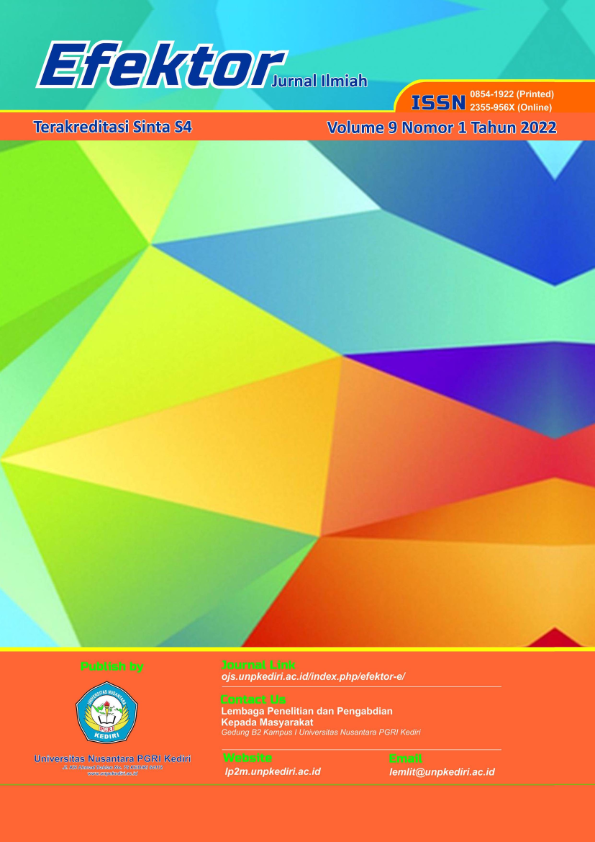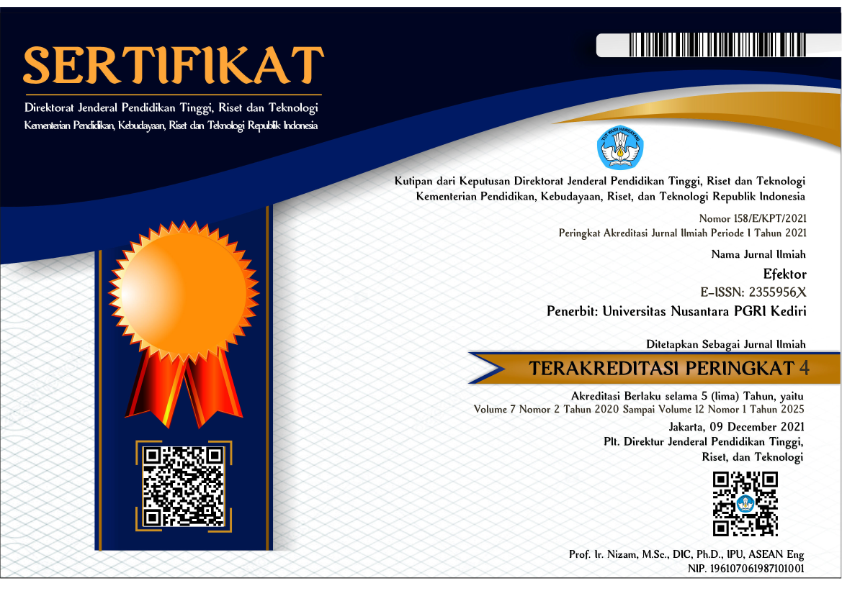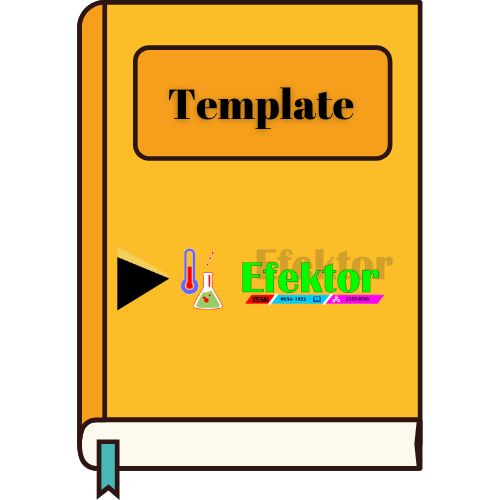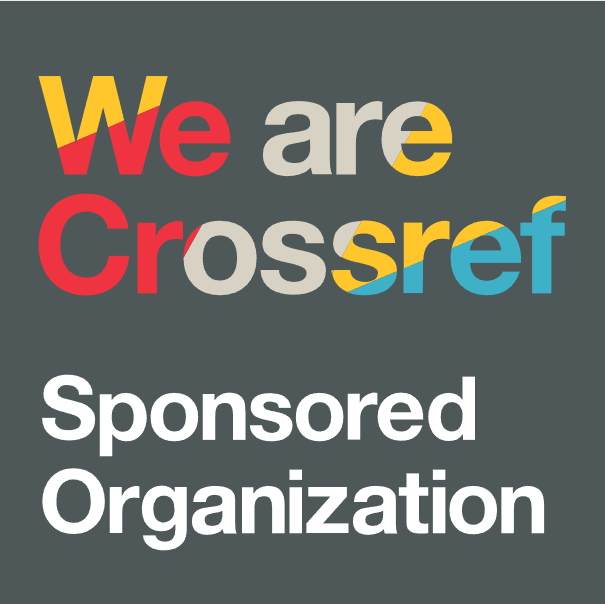Model Pembelajaran Interaktif Sebagai Upaya Implementasi Merdeka Belajar Pada Siswa SD Masa Pandemi Covid-19E COVID-19 PANDEMIC
DOI:
https://doi.org/10.29407/e.v9i1.17603Keywords:
Interactive learning model, free to learnAbstract
The Covid-19 era, learning was carried out online. In the Tegal city, there are schools whose students have diverse backgrounds. They are Muslim, Christian, Hindu, Buddhist. In addition, their ethnicity is also different, some are from Java, Chinese, and Arabic. This should not be an obstacle to learning. Learning without making a fuss about differences, but in reality students still often make differences as a barrier during the learning process. The comfort of students in participating in the learning process is an important thing to strive for. These efforts can be done by applying an interactive learning model. Freedom to learn is a challenge for teachers. Students are given the freedom to develop their talents and interests without pressure. The research objectives include 1) To find out how PHB K Elementary School teachers apply interactive learning models when teaching in order to create independent learning in the classroom. 2) Barriers faced by PHB Elementary School teachers in implementing interactive learning models. This research uses a qualitative approach with the type of case study. Data analysis techniques include data reduction, data presentation and drawing conclusions. The results showed that PHB Elementary School teachers applied an interactive learning model in order to create independent learning in students. The learning model applied is PBL and STAD. In its implementation, there are obstacles, including students who get bored easily when learning online, differences in student characteristics, teachers only get facilities from the foundation, but not from the Ministry of Education and Culture and time constraints.
References
Astuti. 2014. Pengaruh Pendekatan Problen Posing dengan Model Pembelajaran Kooperatif tipe STAD terhadap Kemampuan Komunikasi Matematis Siswa Kelas XII SMA Negeri I Salo Kabupaten Kampar. Jurnal PAUD Tambusai. 1(1).
Barnadib, I. 2013. Filsafat Pendidikan Sistem dan Metode. Yogyakarta: Ombak.
Daryanto. 2016. Media Pembelajaran Peranannya Sangat Penting Dalam Mencapai Tujuan Pembelajaran. Yogyakarta: Gava Media.
Daryanto dan Karim. S. 2017. Pembelajaran Abad 21. Yogyakarta: Gava Media.
Ernawati, R. 2016. Penerapan Model Pembelajaran Aktif-Kooperatif Tipe LSA Terhadap Peningkatan Hasil Belajar Siswa SMA Pada Subkonsep Sistem Imun Manusia. Volume II Nomor 1.
Gunantara, G., Suarjana, I. M., & Riastini, P. N. (2014). Penerapan model pembelajaran problem based learning untuk meningkatkan kemampuan pemecahan masalah matematika siswa kelas V. Mimbar PGSD Undiksha, 2(1).
Hendri, N. 2020. Merdeka Belajar: Antara Retorika dan Aplikasi. E-Tech Journal. Volume 8 Nomor 1.
Hidayat, A. 2016. Pengaruh Penerapan Problem Based Learning (PBL) dipandu dengan Aktifitas Kolaboratif True of False Terhadap Kemampuan Berpikir Kritis Siswa SMA Kelas XI. Jurnal Pendidikan Fisika. 5(7).
Juniati, N. W., & Widiana, I. W. (2017). Penerapan model pembelajaran inkuiri untuk meningkatkan hasil belajar IPA. Jurnal Ilmiah Sekolah Dasar, 1(1), 20-29.
Laoli, A. Y, dkk. 2020. Pengaruh Model E-Learning Berbasis Android terhadap Hasil Belajar Siswa Kelas IV SD Negeri 106144. Jurnal Educatio. 6(2).
Moleong, L. J. 2017. Metodologi Penelitian Kualitatif. Bandung: PT. Remaja Rosdakarya.
Mustaghfiroh, S. 2020. Konsep Merdeka Belajar Perspektif Aliran Progresivisme John Dewey. Jurnal Studi Guru dan Pembelajaran. 3(1).
Permendikbud Nomor 20 Tahun 2018 tentang Penguatan Pendidikan Karakter.
Priansa, D.J., 2019. Pengembangan Strategi dan Model Pembelajaran. Bandung: CV Pustaka.
Purba, J. M, dkk. 2020. Pengaruh Model Pembelajaran Tipe Kooperatif Tipe Scramble terhadap Hasil Belajar pada Tema Tempat Tinggal Ku Kelas IV. Jurnal Elementary School Journal. 10(4).
Purnama, I. L. 2016. Kemampuan Komunikasi Matematis Siswa ditinjau Melalui Model Belajar Kooperatif Tipe Complete Sentence dan Team Quiz. Jurnal Pendidikan Matematika. 10(1).
Purwanto. (2016). Evaluasi Hasil Belajar. Yogyakarta: Pustaka Pelajar.
Rifa’i, A. & Anni. 2016. Psikologi Pendidikan. Semarang: Unnes Press.
Rusman. 2016. Belajar dan Pembelajaran Berbasis Komputer Mengembangkan Profesionalisme Abad 21. Bandung: Alfabeta.
Slameto. (2013). Belajar dan Faktor-faktor yang Mempengaruhi. Jakarta: Rineka Cipta.
Sugiyono. 2016. Metode PenelitianKuantitatif, Kualitatof, dan R&D. Bandung: Alfabet.
Sulfemi, W. B. (2019). Penerapan model pembelajaran discovery learning meningkatkan motivasi dan hasil belajar pendidikan kewarganegaraan. Jurnal Rontal Keilmuan Pancasila dan Kewarganegaraan, 5(1).
Susanto, A. 2019. Teori Belajar dan Pembelajaran di Sekolah Dasar. Jakarta: Prenadamedia Group.
Wantika, R. R. 2017. Pembelajaran Kooperatif Tepe TAI Berdasarkan Beban Kognitif. Jurnal Buana Pendidikan. XII(23)
Daryanto. K. S. 2017. Pembelajaran Abad 21. Yogyakarta: Gava Media.
Ernawati, R. 2016. Penerapan Model Pembelajaran Aktif-Kooperatif Tipe LSA Terhadap Peningkatan Hasil Belajar Siswa SMA Pada Subkonsep Sistem Imun Manusia. Volume II Nomor 1.
Hendri, N. 2020. Merdeka Belajar: Antara Retorika dan Aplikasi. E-Tech Journal. Volume 8 Nomor 1.
Hidayat, A. 2016. Pengaruh Penerapan Problem Based Learning (PBL) dipandu dengan Aktifitas Kolaboratif True of False Terhadap Kemampuan Berpikir Kritis Siswa SMA Kelas XI. Jurnal Pendidikan Fisika. Volume 5. Nomor 7.
Laoli, A. Y, dkk. 2020. Pengaruh Model E-Learning Berbasis Android terhadap Hasil Belajar Siswa Kelas IV SD Negeri 106144. Jurnal Educatio. Volume 6. Nomor 2.
Mustaghfiroh, S. 2020. Konsep Merdeka Belajar Perspektif Aliran Progresivisme John Dewey. Jurnal Studi Guru dan Pembelajaran. Volume 3 Nomor 1.
Permendikbud Nomor 20 Tahun 2018 tentang Penguatan Pendidikan Karakter.
Priansa, D.J., 2019. Pengembangan Strategi dan Model Pembelajaran. Bandung: CV Pustaka.
Purba, J. M, dkk. 2020. Pengaruh Model Pembelajaran Tipe Kooperatif Tipe Scramble terhadap Hasil Belajar pada Tema Tempat Tinggal Ku Kelas IV. Jurnal Elementary School Journal. Volume 10. Nomor 4.
Purnama, I. L. 2016. Kemampuan Komunikasi Matematis Siswa ditinjau Melalui Model Belajar Kooperatif Tipe Complete Sentence dan Team Quiz. Jurnal Pendidikan Matematika. Volume 10 Nomor 1.
Purwanto. (2016). Evaluasi Hasil Belajar. Yogyakarta: Pustaka Pelajar.
Rifa’i, A. & Anni. 2016. Psikologi Pendidikan. Semarang: Unnes Press.
Rusman. 2013. Belajar dan Pembelajaran Berbasis Komputer Mengembangkan Profesionalisme Abad 21. Bandung: Alfabeta.
Slameto. (2013). Belajar dan Faktor-faktor yang Mempengaruhi. Jakarta: Rineka Cipta
Susanto, A. 2019. Teori Belajar dan Pembelajaran di Sekolah Dasar. Jakarta: Prenadamedia Group.
Wantika, R. R. 2017. Pembelajaran Kooperatif Tepe TAI Berdasarkan Beban Kognitif. Jurnal Buana Pendidikan. Volume XII Nomor 23
Downloads
Published
Issue
Section
License
Authors who publish with this journal agree to the following terms:
- Copyright on any article is retained by the author(s).
- The author grants the journal, the right of first publication with the work simultaneously licensed under a Creative Commons Attribution License that allows others to share the work with an acknowledgment of the work’s authorship and initial publication in this journal.
- Authors are able to enter into separate, additional contractual arrangements for the non-exclusive distribution of the journal’s published version of the work (e.g., post it to an institutional repository or publish it in a book), with an acknowledgment of its initial publication in this journal.
- Authors are permitted and encouraged to post their work online (e.g., in institutional repositories or on their website) prior to and during the submission process, as it can lead to productive exchanges, as well as earlier and greater citation of published work.
- The article and any associated published material is distributed under the Creative Commons Attribution-ShareAlike 4.0 International License













